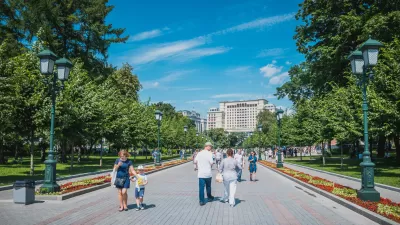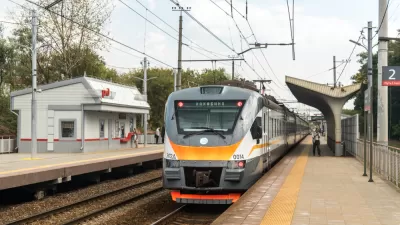Moscow's Mayor has pushed an agenda to beautify the city, create social spaces, and make the city more walkable, but critics see the move towards walkability as more of a forced march.

Moscow has embraced new urbanism and all of it's benefits: pedestrian friendly streets, public spaces, and beautiful landscaping creating an inviting public realm. However, critics of the program to transform the city have noted that the makeover is leaving out or ignoring the input of the city's population. Maria Antonova of Foreign Policyreports that the changes to the city's infrastructure have been quick, sweeping and often done without any warning. While detractors of Moscow Mayor Sergei Sobyanin say the $2 billion city beautification project has been undemocratic, the mayor's backers note that the program is European in outcome, "but its realization is more Asian."
“In Paris or New York it takes two years to redevelop one street: they talk to the residents, they do a test segment, and finally do the actual work,” Muratov said. In Sobyanin’s Moscow, changes are sudden and often unpredictable, with residents treated like minor inconveniences in a process that is moving through the city like wildfire.
...Sobyanin is trying to create social spaces — places where people can enjoy themselves in a pleasant and relaxed environment. These are different from public spaces, where citizens can engage in activities that might make authorities uncomfortable.
“A space can be physically comfortable even in any dictatorship,” Muratov said. “Streets are nice in Singapore.”
Antonova reports that the efforts to remake the city have also resulted in a reigning in of street performers and artists, the removal of the city center's popular trolleybuses, and the destruction of retail kiosks. However, protests of the forced urban renewal have been stifled, with Antonova reporting that some 200 applications to hold protests of the trolleybus removal being denied by the city.
FULL STORY: Vladimir Putin’s Walkable Streets

Maui's Vacation Rental Debate Turns Ugly
Verbal attacks, misinformation campaigns and fistfights plague a high-stakes debate to convert thousands of vacation rentals into long-term housing.

Planetizen Federal Action Tracker
A weekly monitor of how Trump’s orders and actions are impacting planners and planning in America.

San Francisco Suspends Traffic Calming Amidst Record Deaths
Citing “a challenging fiscal landscape,” the city will cease the program on the heels of 42 traffic deaths, including 24 pedestrians.

Defunct Pittsburgh Power Plant to Become Residential Tower
A decommissioned steam heat plant will be redeveloped into almost 100 affordable housing units.

Trump Prompts Restructuring of Transportation Research Board in “Unprecedented Overreach”
The TRB has eliminated more than half of its committees including those focused on climate, equity, and cities.

Amtrak Rolls Out New Orleans to Alabama “Mardi Gras” Train
The new service will operate morning and evening departures between Mobile and New Orleans.
Urban Design for Planners 1: Software Tools
This six-course series explores essential urban design concepts using open source software and equips planners with the tools they need to participate fully in the urban design process.
Planning for Universal Design
Learn the tools for implementing Universal Design in planning regulations.
Heyer Gruel & Associates PA
JM Goldson LLC
Custer County Colorado
City of Camden Redevelopment Agency
City of Astoria
Transportation Research & Education Center (TREC) at Portland State University
Jefferson Parish Government
Camden Redevelopment Agency
City of Claremont




























